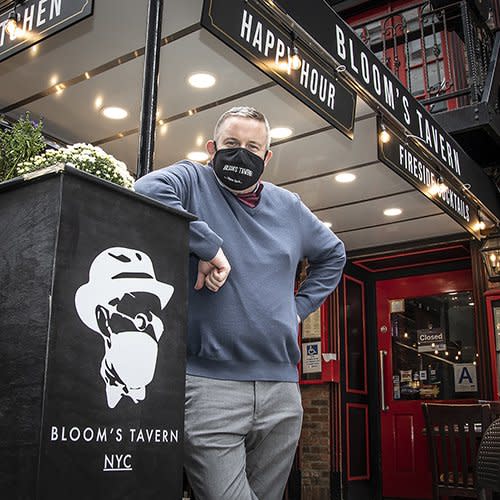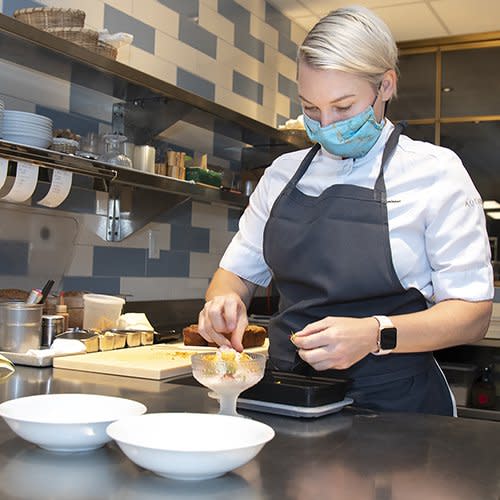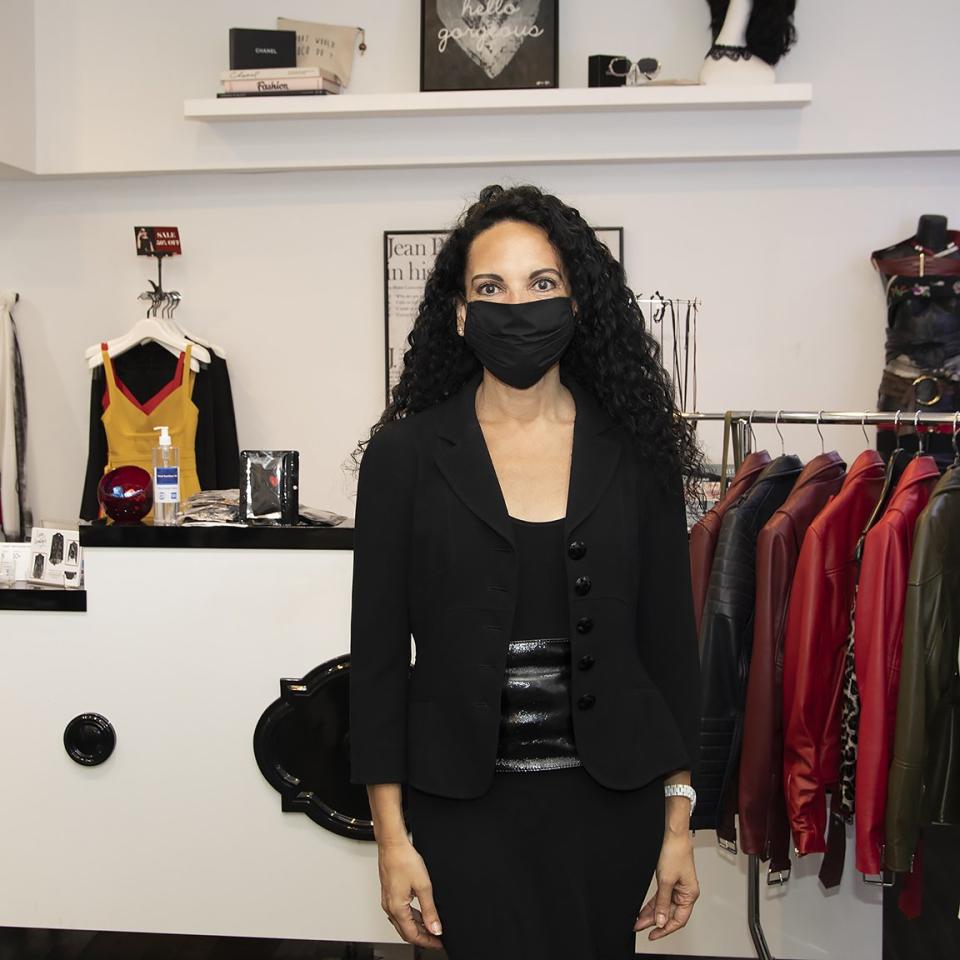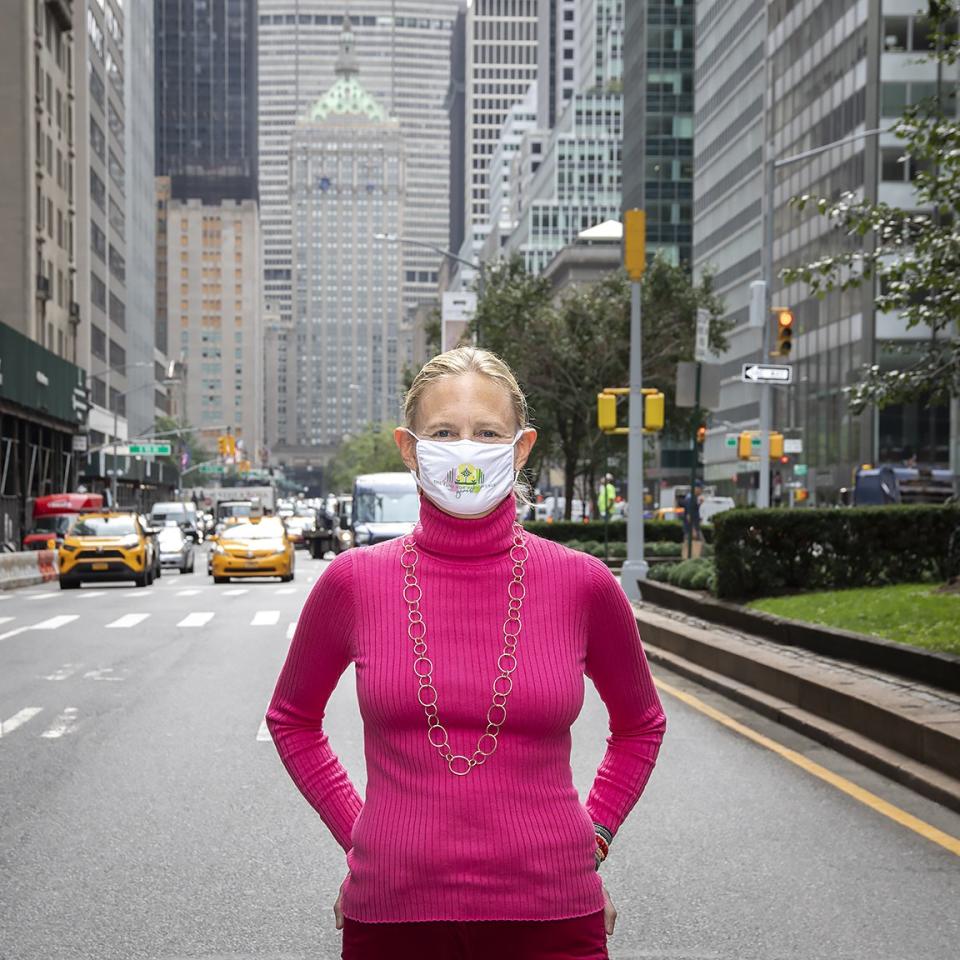Midtown's Small Business Owners Celebrated In Photo Series
MIDTOWN MANHATTAN, NY — The pandemic has thrown every challenge imaginable at small business owners in New York, a city already known for its cutthroat climate, but a new photo and interview series aims to show how the people behind some of Midtown's beloved businesses have remained resilient during the crisis.
The "Faces of East Midtown" series was created by the East Midtown Partnership with the goal of celebrating the neighborhood's humanity and "providing a real, raw and honest look at the faces behind the locally-owned businesses that have gone through unimaginable changes amid the COVID-19 pandemic."
The EMP allowed Patch to republish portions of those interviews, which were conducted over email by EMP staff. Subjects range from a tavern keeper to a salon owner to a chef, sharing how they've survived an unprecedented few months.
Noel Donovan: owner, Bloom's Tavern

East Midtown Partnership: Tell us about your business or place of work. When did you originally open or start and what was your vision?
Noel Donovan: We finally opened the doors of Blooms Tavern in October 2013. The planning, construction, marketing, and all-round head scratching is another story. That started approximately twelve months before that. We wanted to create a comfortable, unassuming “Tavern-Style” environment so we set about transforming a restaurant, which had closed for some time, into what is now Bloom’s. It was a huge project. We had to completely remodel two entire floors, adding two new bar areas. A full new interior, a new balcony and façade. It is a completely different style to previous establishments that were housed here.
EMP: Give us an overview of what things have been like for you and your staff during the Covid-19 lockdown.
ND: It has been an incredible shock for all us really, to experience a city so vast as New York to just shut down. From initially being so excited about our busiest day of the year, St. Patrick’s Day back in March, to a day later trying to figure out all the government red-tape associated with operating a business throughout Covid. It was just exhausting. We immediately got set up and made sure we followed strict guidelines so that our families and friends did not get infected. It is certainly a devastating time to experience living in NYC.
EMP: What's one thing you've either learned, grown to appreciate or adjusted in your business practices moving forward as a result of the pandemic?
ND: I have learned to be humbler and more patient. We have to help each other during times of crisis. We will find a vaccine and therefore hopefully a solution. I wish it were that simple. Hmm, well at least my gardening skill have vastly improved!
EMP: What is your hope for the future of your industry in the city in the coming months?
ND: It is devastating to see so many places closed. The 25% occupancy rate starting September 30th is too small and counterproductive. Sadly, this will result in a more expensive dining experience. I hope the Government can see the damage they are doing to people’s livelihoods. I feel we should give guests the choice if they are comfortable dining indoors or not.
EMP: Any other thoughts you want people to know as they venture out into the neighborhood
ND: 95% of our neighbors have been amazing and highly generous during this difficult time. Most definitely the best people in the world. Sadly the remaining 5% addicted to calling 311 need a new hobby.
Emma Bengtsson: executive chef, Aquavit

EMP: Tell us about your business or place of work. When did you originally open or start and what was your vision?
Emma Bengtsson: Well, I wasn’t here when Aquavit opened 30 years ago but I did come on board in 2010 as the pastry chef. Since then I have transitioned to lead the kitchen as the Executive Chef. Aquavit is a Scandinavian restaurant in New York where we focus on seasonality and Nordic flavors.
EMP: When did you reopen, and how did/does it feel to reopen your doors to the district?
EB: We reopened in May for takeout and delivery and it felt amazing to be back in the kitchen again and cooking for our regulars and fellow New Yorkers. But it also felt sad to not have the vibrant energy in the restaurant that so many of us feed off of.
EMP: What's one thing you've either learned, grown to appreciate or adjusted in your business practices moving forward as a result of the pandemic?
EB: I’ve learned to see the positive sides of being able to offer takeout and delivery. It's not something we have done at Aquavit before and I was able to learn how to cook for takeout and delivery and appreciate how well Scandinavian food can be adapted for this style of cooking.
EMP: Any other thoughts you want people to know as they venture out into the neighborhood
EB: I feel like sometimes Midtown and Midtown East may be underrepresented. There are so many neighborhoods in the city with high foot traffic but no one really talks about Midtown East. It’s so much more than just office buildings. There are beautiful restaurants and shops here. It's a vibrant neighborhood and for those shopping on Fifth Avenue, Aquavit is just a few steps away and perfect to take a break and have a nice meal or a drink.
Geralynn Madonna: owner, Madonna & Co. Boutique and Beauty Bar

EMP: Tell us about your business or place of work. When did you originally open or start and what was your vision?
Geralynn Madonna: We are a fashion Boutique & Beauty Bar. We opened our East 60th location in 2015!
EMP: Give us an overview of what things have been like for you and your staff during the Covid-19 lockdown?
GM: Our physical location was completely closed during the shutdown. Like many other retailers, the website was up but we could not ship out orders the entire time. We all love what e-commerce has done for our lives in so many ways, but it took a pandemic to realize that without a physical store, it’s difficult to continue getting to know your customers and fostering that face-face interaction. Receiving e-mails and calls during the lockdown from so many of our customers was a true gift and will always be remembered.
EMP: After being shuttered for months, several more businesses are slowly starting to reopen in the district. What does that mean to you?
GM: We are located between a couple of great restaurants on East 60th. With the “outside dining” rule still in place in NYC, we gave up our storefront to the restaurant next door. It is very surreal to see tables outside and 60th street becoming restaurant row! The customers seem to like it and even stay under our awning in the rain! We hope to get our storefront back at some point, maybe as the weather chills!
EMP: What is your hope for the future of your industry in the city in the coming months?
GM: The most important thing…. We hope that everyone begins to feel safe again. When that happens everything else will continue to get better! Until then working together with our neighboring businesses and asking our customers what they need and want to make them feel more comfortable is critically important.
Barbara McLaughlin: president, The Fund for Park Avenue

EMP: Tell us about your business or place of work. When did you originally open or start and what was your vision?
Barbara McLaughlin: The Fund for Park Avenue is the non-profit organization responsible for planting, lighting and maintaining the trees and flowers on the Park Avenue Malls, eight which are located in East Midtown. Through the Park Avenue Malls Planting Project we provide three seasonal plantings ... as well as all the necessary maintenance.
The Park Avenue Tree Lighting is the continuation of a tradition that first started in 1945 when a small group of Park Avenue families lit fir trees to honor their loved ones who had died in World War II. Now over 100 trees illuminate the avenue each winter thanks to the contributions we receive from the community.
EMP: After being shuttered for months, several more businesses are slowly starting to reopen in the district, what does that mean to you?
BM: That more people can enjoy the seasonal plantings – the tulips, begonias and the flowering trees were especially beautiful this spring and summer. It’s nice to feel some of the energy on the streets coming back.
EMP: Any other thoughts you want people to know as they venture out into the neighborhood
BM: I hope that as people return to the district, the seasonal plantings and the illuminated fir trees bring them a sense of calm during this very uncertain time. And maybe now that they know a little more about The Fund and what we do, they’ll want to make a contribution!
Amy Babic: owner, Kurant Wine Bar, La Cava, Copinette

EMP: Tell us about your business or place of work. When did you originally open or start and what was your vision?
Amy Babic: I am fortunate to have three businesses in East Midtown. La Cava (East 50th Street and Second Avenue) is a small wine bar opened in 2010, Kurant Wine Bar (East 57th Street and Second Avenue) opened in 2013, and Copinette (East 50th Street and First Avenue) in 2018 is a much larger restaurant. Our goal has always been to provide great quality wines, affordable tasty food, and service where the bartender probably knows your name and what you're drinking.
EMP: Give us an overview of what things have been like for you and your staff during the Covid-19 lockdown.
AB: Like most restaurants, we fully closed March 16th. We knew takeout would not even come close enough to sustain anything. We tried to stay optimistic as best we could. Holding on for one or two months is such a different mindset than what we know now to be six-plus months.
EMP: When did you reopen, and how did/does it feel to reopen your doors to the district?
AB: We reopened mid-May for takeout. It was a different world then. Not being able to serve people or not being allowed to catch up with people on the sidewalk. Getting used to wearing masks had its learning curve for both staff and customers.
The weather started to get warmer and it was wonderful to see familiar faces but sadly many neighbors and customers have left town or are still out of town. As we get closer to fall it does feel like there is a return. I’m getting more messages, emails and calls that people are coming back so hopefully that is happening across the city. It will be different but as long as people are returning things will be moving in the right direction. We’ve always had a great happy hour, but without people going to an office when they can work virtually will happy hour ever be the same?
EMP: After being shuttered for months, several more businesses are slowly starting to reopen in the district. What does that mean to you?
AB: When businesses reopen it truly brings life to the neighborhood. We have always loved that Second Avenue has always been a destination for dining. People don’t have to decide where they’re dining. They can walk by see who has an available table. If one is full they can dine at the next one. Each business brings more employees who are likely to grab coffee, lunch, dinner or go shopping before/after their shift. The more open businesses the better for everyone.
EMP: Any other thoughts you want people to know as they venture out into the neighborhood?
AB: If you look around at who’s open, those are the businesses that are fighting tooth and nail, those are the working owners who make daily sacrifices to keep their doors open. Closing and walking away from our lives' work isn’t an option. We’ve been a part of so many happy memories for those who have dined with us. I’m proud to work in Midtown East among so many who have greatly contributed to our community.
David Hanouna: sales director, Modani

EMP: Tell us about your business or place of work. When did you originally open or start and what was your vision?
David Hanouna: Modani Furniture was founded in Miami in 2007 by three entrepreneurs with an affinity for design. The concept of selling modern furniture at friendly prices both in-store and online is what helped shape the successful brand and is something that we all take pride in today.
EMP: Give us an overview of what things have been like for you and your staff during the Covid-19 lockdown.
DH: As soon as the lockdown occurred, we had to implement some changes and adapt the overall work environment. Some employees remained working from home while others waited patiently, shuttered, to see when the office would reopen. The lockdown was stressful for all of us. It's extremely frustrating to rework a business model that was in glowing shape up until the pandemic, but that is what we did.
We took the time to rework our office structure to allow for more at home work. Taking a step back during the pandemic also allowed us to figure out what is working and what improvements can be made. Sometimes being so close to the business you can't have a minute to evaluate all needs. The lockdown was stressful but we are excited to be in business and make new strides for 2021.
EMP: After being shuttered for months, several more businesses are slowly starting to reopen in the district. What does that mean to you?
DH: We never like to see businesses closing down. COVID -19 has brought some challenges to businesses that we have never experienced before. While we are grateful to remain in business, our hearts go out to those who have closed for good. The reopening of businesses is something we can't wait to see. For us, opening means a new opportunity to grow as a business while also helping the community rebuild. We are grateful for our customers loyalty during these hard times and we are excited for what the future holds.
EMP: What is your hope for the future of your industry in the city in the coming months?
DH: We hope to see more people moving into the city and to see more infrastructure being built. New movers to us means a new market along with an indication that the city is beginning to recover. We hope that in the next few months the city can get into a place of rebuilding and laying the foundation for prosperity.
This article originally appeared on the Midtown-Hell's Kitchen Patch

